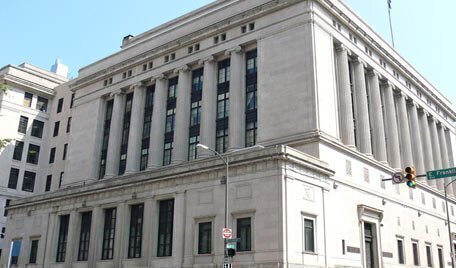West Virginia’s Supreme Court impeachment proceedings could be a move to check a corrupt court or an attack on a state judiciary system’s independence, depending on a person’s viewpoint. But the drama’s outcome this fall could have national implications.
 In our system of Federalism, state legislatures pass most of the laws that affect citizens’ daily lives, and state supreme courts have a crucial role in evaluating appeals about cases involving those laws. State supreme courts also serve an important role as the final stop before the United States Supreme Court for appeals that originate in each state’s judicial system and involve questions about federal laws or the U.S. Constitution.
In our system of Federalism, state legislatures pass most of the laws that affect citizens’ daily lives, and state supreme courts have a crucial role in evaluating appeals about cases involving those laws. State supreme courts also serve an important role as the final stop before the United States Supreme Court for appeals that originate in each state’s judicial system and involve questions about federal laws or the U.S. Constitution.
The West Virginia situation is drawing national attention because the state may be the first in U.S. history to bring impeachment charges against its entire Supreme Court of Appeals. Officials in several other states have discussed the impeachment and removal of elected judges as a remedy to what they believe is a “separation of powers” problem.
In the late-night hours of August 13, West Virginia’s Republican-controlled House of Delegates passed articles of impeachment against all four sitting Justices, accusing them of maladministration, corruption, incompetence, neglect of duty, and certain high crimes. (Justice Menis Ketchum had previously resigned after being charged with wire fraud for personal use of a state vehicle and fuel card. He recently pled guilty to those charges.)
On Saturday, August 25, Gov. Jim Justice named Republicans Tim Armstead and Rep. Evan Jenkins to fill the seats vacated by Justice Robin Davis and Ketchum, both elected as Democrats. Davis had retired after the impeachment charges were approved.
Impeachment trials are set to begin in the state senate on September 11. A two-thirds senate majority is needed to convict. If any justices are convicted, Gov. Justice will appoint replacements that will serve until 2020. Armstead and Jenkins will serve until November 2018, when they will have to run in a special election to attempt to keep their seats.
Most of the impeachment articles pertained to lavish office renovations spending. The court as a whole was impeached for failing to rein in the so-called irresponsible spending. Other articles pertained to accusations that the Justices broke the law by overpaying retired circuit judges to fill in as substitutes for absent Justices.
The alleged excessive use of public funds has played into long-standing accusations that the West Virginia Supreme Court is corrupt. James Sample, professor of law at the Maurice A. Deane School of Law at Hofstra University, wrote that “West Virginia may well be ground zero for judicial unseemliness.”
In addition to the justices’ spending, Sample cites numerous indiscretions committed by West Virginia justices, including that of then-Chief Justice Elliot “Spike” Maynard. In 2008, Maynard cast the deciding vote overturning a $50 million jury verdict against the companies of coal executive Don Blankenship. Shortly thereafter, photos surfaced of Maynard and Blankenship vacationing together in the midst of the appeal. Members of the West Virginia Supreme Court have long accepted large campaign donations from individuals who later become litigants in front of their court.
Sample notes similar examples of lapses in judicial ethics from around the country, arguing that, increasingly, “America’s courts are failing to check themselves.”
Many West Virginia Democrats and other commentators have decried the impeachment proceedings as a “coup” - a Republican attempt to grab control of all three branches of government in violation of separation of powers. Gov. Justice, who switched his affiliation from Democrat to Republican mid-term in 2017, is accused by opponents of stacking the court with Republicans.
“When a legislative body attempts to dismantle a separate branch of government, the immediate effects, as well as the precedent it sets for the future, can only be deemed disastrous,” Justice Davis said in a press conference announcing her retirement.
Concerns over erosion of separation of powers were expressed by some commentators as well.
“West Virginia headlines a potentially troubling trend among state legislatures this year of politicians moving to exert control over a separate branch of government,” writes Amber Phillips of the Washington Post.
Phillips cites research from the Brennan Center for Justice showing that, in the past 25 years, just two state judges were impeached. In 2018, four justices have been impeached in West Virginia alone, and lawmakers in 16 states have considered more than 50 bills that would “diminish the role or independence of” the judiciary.
A recent example of such legislation came earlier this year in Pennsylvania when Republican lawmakers filed a resolution to impeach Democratic justices who voted down the Republican-drawn congressional map.
And on August 17, Dallas Woodhouse, the executive director of the North Carolina Republican Party, raised the possibility of impeaching state Supreme Court judges if they ruled against his party in a dispute over state constitutional amendments. Woodhouse later told a newspaper he raised the issue because such a ruling would represent “an evisceration of separation of powers.”
The American Bar Association says 38 states use competitive elections to choose state Supreme Court judges.
Jackie McDermott is Constitutional Content Coordinator at the National Constitution Center.







